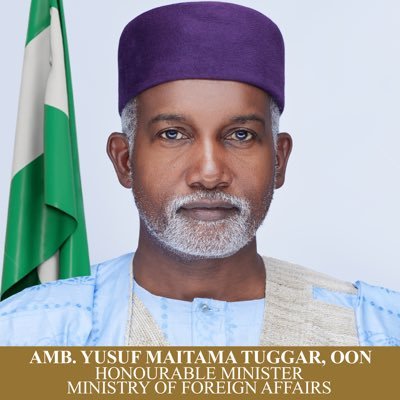Nigeria’s Minister of Foreign Affairs, Yusuf Tuggar, has said that the country’s foreign policy thrust is targeted on the use of proactive diplomacy in reversing the trend of coups in West Africa and the African continent.
He stated this while delivering a lecture on “The Foreign Policy Agenda under the Tinubu Administration,” at the Annual Association of Retired Career Ambassadors of Nigeria (ARCAN) Foreign Policy Lecture in Abuja, Nigeria.
4-Ds Foreign Policy Agenda
According to the Minister, Nigeria’s 4-Ds foreign policy agenda (Democracy, Diaspora, Demography and Development) is also targeted towards the country getting a permanent seat at the United Nations Security Council, other global organizations and institutions.

He explained that the Democracy in 4-Ds call for democracy in global organisations and institutions that remain exclusive clubs under “Sketchy criteria.”
“4-Ds require working for Nigeria’s permanent membership of the United Nations Security Council, G20 and all other relevant groupings where democratic norms, size of population and size of the economy ought to be the yardstick for membership.
“Nigeria’s agitation for a permanent United Nations Security Council, seat is historic; President (Bola) Tinubu unequivocally demanded membership of the G20 during its 80th Summit in India, AU admittance notwithstanding, the 4-Ds Tinubu Doctrine is at work.”
Tuggar also said President Tinubu’s 4-Ds would amplify the country’s decision to stay neutral in international politics.
On reforms in Nigeria’s Ministry of Foreign Affairs, he said the government plans to reintroduce undersecretaries in a bid to achieve the set foreign policy agenda under President Bola Tinubu’s administration.

The Minister said President Tinubu’s 4Ds foreign policy (Democracy, Diaspora, Demography and Development) could be attained in a technology-driven foreign affairs ministry with appropriate bureaucracy.
“None of these (4Ds) will be possible without reforming our workplace- the ministry- into a technology-driven environment with the right bureaucracy to achieve our smart objectives.
“The reform is already in place and we are improving the working terms and conditions of the ministry’s staff.
“We also intend to bring back the system of undersecretaries in the New Year, with the return of several senior ambassadors.”
The Minister added that Nigeria’s foreign policy objectives still exist and are entailed in the country’s constitution.
“With regards to Nigeria’s foreign policy objectives, they exist and remain immovable because they are enshrined in our constitution.
“They are: to promote and protect Nigeria’s national interest, to promote African integration and support African unity, promote international co-operation for the consolidation of universal peace and mutual respect among all nations and elimination of discrimination in all its manifestations.”
Tuggar further explained that Nigeria, being Africa’s largest democracy would pull its weight to ally with other democracies and constitutional governments to reverse the trend of unconstitutional change of government in countries in the region and the African continent.
“The seeming domino effect of military coups and unconstitutional changes in government in our West African region and beyond calls for proactive diplomacy in order to reverse the trend and restore peace.”
“The threat to peace from terrorism and irredentism in the Sahel can only be countered with a solid foundational basis of constitutional governance, strong democratic institutions and an alliance of democratic countries in the region.”
He said Nigeria, being Africa’s largest democracy would pull its weight to ally with other democracies and constitutional governments to reverse the trend.
In his welcome address, the President of ARCAN, Ambassador John Shinkaiye, said Nigeria was facing significant security challenges including terrorism, insurgency and internal conflicts, adding that dealing with these issues would require collaborating with regional, continental and global partners.
Ambassador Shinkaye, who outlined the significance of foreign policy in national governance, explained that Nigeria’s foreign policy would be shaped by domestic factors, regional dynamics, and global realities, highlighting the importance of understanding how these factors impact the country’s stance on key issues such as security, economic cooperation, and international relations.
In his remarks, President, Society for International Relations Awareness (SIRA), Mr. Owei Lakemfa, the Chairman of the 2023 ARCAN Lecture, said, “Foreign Policy is a reflection of Domestic Policy as according to him, no country can be great if its Domestic Policy is floundering and not sound.
“If we want to have an effective Nigerian Foreign Policy, four things are important. First, we must ensure the welfare and well-being of ordinary Nigerians. Secondly, we need to ensure the security of Nigeria and Nigerians. Thirdly, we must build a strong economy and currency, and fourthly, we must defend and promote the first three.”



Comments are closed.